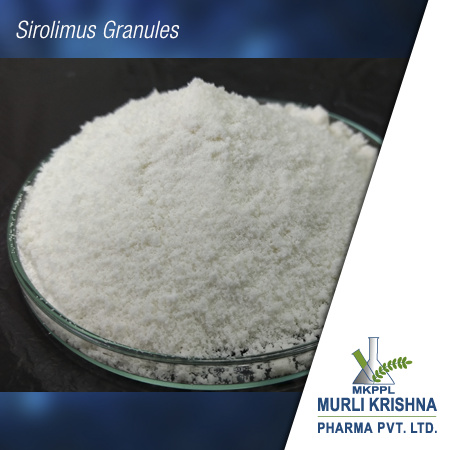Sirolimus (initially known as Rapamycin) is a macrolide antibiotic with immunosuppressant properties. It is typically used to prevent rejection of organ transplantations especially in kidney transplants. Sirolimus has an anti-proliferative effect which makes it an effective treatment option for mesothelioma.
Additional information
| Percentage | 0.3%, 0.6%, 1.2% |
|---|---|
| Mesh Size | 16# 20, 35#70 |
| Release Type | Immediate Release |
| Quality Standard | USP43 |
| Documentation Available: | DMF in CTD Format |
| Forms of PFI | Granules (for Tablets) |
| Target Formulations | Capsules, Tablets |
Description
Unlike the similarly-named tacrolimus, sirolimus is not a calcineurin inhibitor. However, it has a similar suppressive effect on the immune system. Sirolimus inhibits the response to interleukin-2 (IL-2) and thereby blocks activation of T- and B-cells. In contrast, tacrolimus inhibits the production of IL-2.
The mode of action of sirolimus is to bind the cytosolic protein FK-binding protein 12 (FKBP12) in a manner similar to tacrolimus. However, unlike the tacrolimus-FKBP12 complex which inhibits calcineurin (PP2B), the sirolimus-FKBP12 complex inhibits the mammalian target of rapamycin (mTOR) pathway by directly binding the mTOR Complex1 (mTORC1). mTOR is also called FRAP (FKBP-rapamycin associated protein) or RAFT (rapamycin and FKBP target). FRAP and RAFT are actually more accurate names since they reflect the fact that rapamycin must bind FKBP12 first, and only the FKBP12-rapamycin complex can bind FRAP/RAFT/mTOR.
The drug, of late has been prescribed for the treatment of cancer especially for carcinoma Induced through long term cyclosporine therapy.


